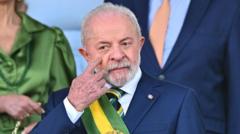How Did Lula Respond to Trump's Comments on Bolsonaro's Trial and Tariffs?

Published: 2025-09-15 08:50:17 | Category: world
This article delves into the recent developments surrounding Brazil's President Luiz Inácio Lula da Silva and the sentencing of his predecessor, Jair Bolsonaro, to over 27 years in prison for attempting to undermine democracy. Lula has publicly defended the trial, countering claims of it being a "witch hunt" while also addressing economic tensions with the United States, particularly regarding tariffs imposed by President Donald Trump.
Last updated: 15 October 2023 (BST)
Key Takeaways
- Lula defends Bolsonaro's trial as a necessary step for democracy.
- Trump's tariffs are seen as politically motivated by Lula.
- Bolsonaro was found guilty on all charges by Brazil's Supreme Court.
- Lula emphasises the legitimacy of Brazil's judicial system.
- Open dialogue with the US is encouraged, yet sovereignty is non-negotiable.
The Background of the Trial
The sentencing of Jair Bolsonaro has drawn significant attention both domestically and internationally. Bolsonaro, who served as Brazil's president from January 2019 until December 2022, faced serious allegations of plotting a coup, which have been linked to the events surrounding the Capitol riots in the United States. The culmination of the trial saw four out of five Supreme Court justices find him guilty of all five charges, culminating in a sentence of 27 years and 3 months.
This landmark decision is seen as a pivotal moment in Brazilian politics, marking a clear stance against actions deemed threatening to the democratic processes established post-military rule. Lula, who himself was imprisoned on corruption charges before his election victory in 2022, has been vocal about the importance of upholding democratic institutions.
Lula's Defence of the Judicial Process
In his opinion piece for the New York Times, Lula firmly rebuffed the narrative set forth by Trump, who described the trial as a "witch hunt." Lula stated that the judicial proceedings were conducted in alignment with Brazil's 1988 Constitution, which was established following decades of military dictatorship. He highlighted that the ruling was not only fair but necessary for the protection of democracy.
By framing the trial as a historic decision, Lula aims to reinforce the message that Brazil is committed to the rule of law, despite Bolsonaro’s claims of political persecution. He underscores that these actions are crucial in safeguarding the democratic freedoms that Brazilians fought hard to restore.
Economic Relations with the United States
Lula's article also tackles the complex economic relationship between Brazil and the United States. In light of Trump's recent imposition of a 50% tariff on Brazilian imports, Lula labelled this decision as "misguided" and "illogical." He pointed out that over the past 15 years, the United States has enjoyed a significant trade surplus with Brazil, amounting to approximately $410 billion (£302 billion) in goods and services.
By stating this, Lula draws attention to the fact that the tariff increases may stem more from political motivations rather than genuine trade concerns. He posits that the US government's actions may be an attempt to shield Bolsonaro from accountability, particularly through the use of sanctions against the Supreme Court justice who led the trial.
The International Response
The verdict against Bolsonaro has not only sparked reactions within Brazil but has also caught the attention of international leaders. Trump expressed his surprise at the ruling, while US Secretary of State Marco Rubio announced that the US would "respond accordingly to this witch hunt." This reflects the tensions that have developed between the two nations, particularly surrounding issues of justice, democracy, and trade.
Lula's Call for Dialogue
Despite the ongoing tensions, Lula extended an olive branch to President Trump, inviting dialogue that could lead to mutual benefits. He emphasised that Brazil remains open to negotiations that can foster economic cooperation, but he firmly stated that Brazil's sovereignty and democratic principles are non-negotiable. This statement is significant, as it reinforces Brazil's commitment to its democratic values amidst external pressures.
Lula's approach suggests a nuanced understanding of the need for diplomacy, especially in light of the complex interplay between domestic actions and international relations. He seeks to position Brazil as a nation willing to collaborate but steadfast in its principles.
Conclusion: A Pivotal Moment for Brazil
The trial and sentencing of Jair Bolsonaro represent a critical juncture in Brazil’s political landscape. It highlights the ongoing struggle for democracy in a nation that has experienced significant political turmoil. Lula's defence of the judicial system and his calls for respectful dialogue with the United States exemplify a leader determined to navigate the complexities of governance while upholding democratic values.
As Brazil moves forward, it is essential to monitor how these developments will influence both domestic policies and international relations, particularly with the United States. The interplay between justice, democracy, and economic interests will undoubtedly shape Brazil’s future trajectory.
FAQs
What led to Bolsonaro's trial and sentencing?
Jair Bolsonaro was tried for plotting a coup against Brazil's democratic institutions. He was found guilty of multiple charges, resulting in a sentence of 27 years and 3 months.
How did Lula defend the trial?
Lula defended the trial by asserting it was conducted fairly under Brazil's 1988 Constitution and argued that it was essential for safeguarding democracy.
What are the economic implications of Trump's tariffs on Brazil?
Trump's 50% tariffs on Brazilian imports have been labelled as politically motivated by Lula, who argues they are misguided given the US's significant trade surplus with Brazil.
How has the international community reacted to Bolsonaro's sentencing?
International leaders, including Trump, have expressed surprise and concern over Bolsonaro's sentencing, with some characterising it as a "witch hunt."
What is Lula's stance on US-Brazil relations?
Lula advocates for open dialogue with the US, seeking negotiations that can bring mutual benefits while asserting that Brazil's sovereignty and democratic principles are non-negotiable.



